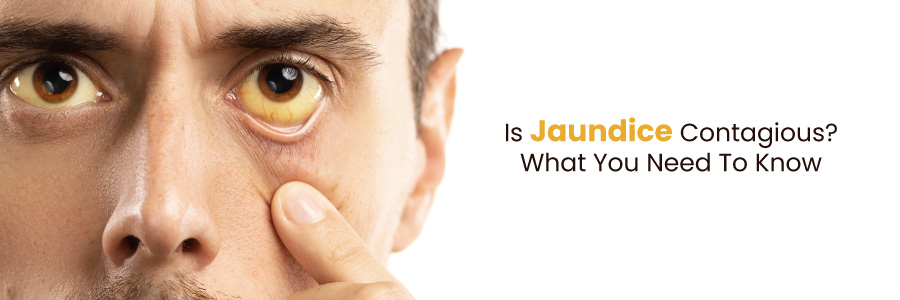- Cardiology 84
- Dermatology 45
- Endocrinology 33
- ENT 16
- Fertility 190
- Gastroenterology 78
- General-Medicine 81
- Gynecology 80
- Hematology 19
- Infectious-Diseases 33
- Neurology 52
- Oncology 34
- Ophthalmology 23
- Orthopedics 69
- Pediatrics 31
- Procedure 23
- Public-Health 144
- Pulmonology 59
- Radiology 8
- Urology 68
- Wellness 161
- Woman-and-child 77

Is Jaundice Contagious? What You Need To Know
Yellow or pale skin is not a disease in itself but a symptom of an underlying blood or liver disorder!
Jaundice is a yellowish discolouration of the eyes, skin, and mucous membranes caused by high bilirubin levels (a yellowish pigment found in the bile, a fluid made by the liver). The level of bilirubin in the blood determines the colour tone. When bilirubin levels are mildly increased, the skin/whites of the eyes are yellowish; when levels are high, they are brownish.
Secure your health with a second opinion. Make informed decisions and book your appointment today!
Get A Second OpinionCan Jaundice Spread From Person To Person?
Jaundice isn’t contagious, but the underlying conditions that cause it can be. Let’s clear this!
Fluid build-up in the body produces this condition, which results in yellow skin and eyes. The condition isn't harmful in and of itself, but it can indicate a number of diseases that should be treated by a medical professional. However, it’s important to know details about jaundice in terms of causes, symptoms, and treatments.
What Causes Jaundice?
The liver's major role is to eliminate bilirubin, a byproduct of the normal breakdown of red blood cells. When the liver fails to take it from the bloodstream, metabolises it, and excrete it as bile, it causes jaundice.
Therefore, suffering from jaundice could be an indication of:
- A defect in the liver that prevents it from extracting and eliminating bilirubin.
- Bile duct blockage. (Cancer, gallstones, or bile duct inflammation can all block the bile duct.)
- There is too much bilirubin created for the liver to eliminate from the blood (For example, in case of malaria where there is rapid destruction of red blood corpuscles, very high levels of bilirubin are produced).
Ready to take control of your health journey? Book your appointment now and start your path towards wellness today!
Book an AppointmentWhat Diseases Cause Jaundice?
Several common conditions can cause an increase in bilirubin production. Hepatitis B and C, alcoholic liver disease, liver cancer, and pancreatic cancer are some of the disorders that induce jaundice. Some medications may also cause jaundice. This occurs as a result of medications being metabolized by the liver.
Jaundice Symptoms
The severity of symptoms depends on the underlying causes. If you have jaundice for a short period of time (typically caused by infection), you may have the following symptoms and signs:
- Yellow staining of the skin and tongue
- Clay-coloured and foul-smelling faeces
- Loss of appetite
- Slow pulse
- Deep yellow-coloured urine
- Fever and headache
- Undue fatigue
- Nausea and severe constipation
- Itchy skin and having a bitter taste
Prevention And Treatment Of Jaundice
Here are some ways to prevent jaundice:
- Get immunised against Hepatitis B
- Prefer to eat in hygienic places
- Limit alcohol consumption
- Deep yellow-coloured urine
- Hepatitis B can be transmitted through intercourse, therefore practise safe sex
As previously stated, jaundice is an indication of a disease!
So, if you suspect any symptoms of jaundice, you must visit a doctor. The treatment requires the diagnosis of the specific cause of jaundice.
A light diet rich in fruits and vegetables, as well as plenty of fluids such as fruit juices, tender coconut water, and buttermilk, is typically recommended to relieve the strain on your sluggish liver.
Jaundice Warning!
If diagnosed with jaundice, say no to alcohol, fried or heavy foods. Jaundice can be serious when bilirubin levels are very high in the body and it can lead to complications such as liver failure, and sepsis.
Don’t wait for the symptoms to get severe.
Get your check-up done with Our Expert Gastroenterology!
Citations
Evaluation and Treatment of Jaundice in the Term Newborn: A Kinder, Gentler ApproachFrequently Asked Questions
Yes, newborn babies can develop jaundice due to their immature liver function, but it is usually temporary and not contagious.
No, jaundice is not contagious. It is a symptom of underlying health conditions affecting the liver, not a virus or bacteria that can spread from person to person.
Jaundice itself is a symptom and not always serious, but it can indicate underlying health problems that need medical attention.
Preventing jaundice involves managing liver health by avoiding excessive alcohol intake, and engaging in safe sexual behavior to avoid hepatitis and maintaining a healthy diet and weight.
There is a vaccine for hepatitis A & B, which are viral infections that can cause jaundice. Vaccination can help prevent these infections.
Jaundice may return if the underlying cause, such as liver disease, is not fully treated or if there are recurring infections or other health issues.
The duration of jaundice depends on its cause. Some types of jaundice, like that in newborns, may resolve on their own, while others require ongoing management.

- Cardiology 2132
- Dermatology 168
- Endocrinology 135
- ENT 97
- Fertility 217
- Gastroenterology 232
- General 478
- General-Medicine 1685
- Gynecology 169
- Hematology 85
- Infectious-Diseases 208
- Neurology 207
- Oncology 345
- Ophthalmology 65
- Orthopedics 187
- Pediatrics 83
- Procedure 72
- Public-Health 209
- Pulmonology 126
- Radiology 13
- Second Opinion 311
- Urology 294
- Wellness 600
- Woman-and-child 447
Related Blogs
If you have any questions, please fill out the enquiry form or call us, and we will get back to you promptly.
040-68334455